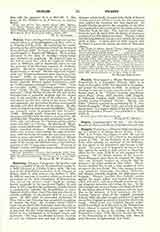

Pichler, VITUS, distinguished canonist and controversial writer, b. at Grossberghofen, May 24, 1670; d. at Munich, February 15, 1736. He studied for the secular priesthood, but after ordination entered the Society of Jesus, September 28, 1696. For four years he was professor of philosophy at Brigue and Dillingen. He was then advanced to the chair of theology, controversial and scholastic, at Augsburg. He acquired fame in the field of canon law, which he taught for nineteen years at Dillingen, and at Ingolstadt, where he was the successor of the illustrious canonist, Fr. Schmalzgrueber. His latest employment was as prefect of higher studies at Munich. His first important literary work was “Examen polemicum super Augustana Confessione” (1708), an examination of the Lutheran Augsburg Confession. Other controversial works followed, generally directed against Lutheranism, such as “Lutheranismus constanter errans” (1709); “Una et vera fides” (1710); “Theologia polemica particularis” (1711). In his “Cursus theologise polemical universal” (1713), Pichler devotes the first part to the fundamentals of polemical theology and the second part to the particular errors of the reformers. It is said that he was the first writer to lay down, clearly and separately, the distinction between fundamental theology and other divisions of the science. He also wrote an important work on papal infallibility, “Papatus nunquam errans in proponendis fidei articulis” (1709). Although widely renowned as a polemical theologian, Pichler is better known as a canonist. He published his “Candidatus juris prudential sacral” in 1722; this was followed by “Summa jurisprudential sacra universal” in 1723 sqq. He also issued “Manipulus casuum jiridicorum” and several epitomes of his larger canonical treatises. Pichler‘s controversial works were in great vogue during the eighteenth century, while his books on canon law were used as text-books in many universities. His solutions of difficult cases in jurisprudence gave a decided impetus to the study of the canons and afforded a key to the intricate portions of the “Corpus juris canonici”. Fourteen of Pichler‘s works, excluding the many editions and alterations, are enumerated.
WILLIAM H. W. FANNING

